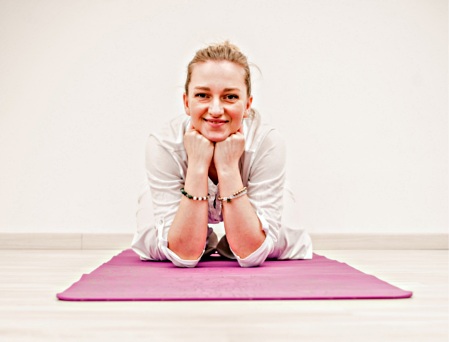Authored by Dr. Mary James, ND
Racing thoughts can take over when you’re trying to get to sleep, struggling to focus or hovering on the brink of an anxiety attack. Wouldn’t it be nice to be able to quiet everything down and even turn off the panic? Turns out you have a built-in calming system that can help you feel less on edge.

Why your mind races
Anxiety is the little monster that sets off racing thoughts. You can become anxious about almost anything, even if it starts small. Whether it’s the undone tasks on your to-do list, a pending confrontation with a co-worker or a sick kid, your mind is prone to fixating on any issue that’s unresolved — especially at night when you’ve stopped running around.
Once anxiety gets a toehold, your thoughts will begin to race — often in repetitive, circular patterns that feel familiar. Reasoning away your galloping thoughts feels impossible because you’re stuck in those very patterns. You may even feel additional symptoms like sweating, nausea, shallow breathing or shaking. These are all signs of the “fight or flight” response.
While everyone worries about something now and then, middle-aged women tend to have more anxiety than they used to. Many studies connect anxiety, serotonin and hormone status, especially when a woman’s estrogen is fluctuating.
A lot of women seek help with their hormones in midlife, whether it’s with natural hormonal-balancing methods, or even hormone treatments. But there’s more to racing thoughts than shifting hormones.
Family and life changes, financial worries and fears about aging can instantly position you to become more anxious, even about little things. And even though you’re focused on real-life circumstances, physical contributors, such as low blood sugar or caffeine in your system, can also intensify anxious ruminations, making situations feel worse than they are.
When it’s so hard to convince yourself to be calm
If you’re like most women, when your mind is anxiously racing, you’re probably mostly focused either on the past (regrets) or on the future (anticipating bad outcomes). Where you are least focused is on the present moment, which ironically is the place where you can feel the safest.
I’ve often thought of the human brain as a pessimistic chatterbox. It’s wired for survival so it naturally stays on the lookout for danger. While that’s good in many ways, the brain’s thought process can benefit from being reined in and reassured in moments of high stress.
There are some effective physical methods you can use to break the cycle of anxiety and feel better.

Calming techniques that can stop racing thoughts
Because racing thoughts result partly from getting stuck in your brain, it helps in those anxious moments to reconnect with your body and the physical world. Plant both of your feet on the ground. Take slow, deep breaths as you tune into your breathing, sensations in your body and the earth beneath your feet.
The physical mechanism you’ll be activating is the parasympathetic nervous system. It’s the healing and relaxation half of your autonomic nervous system. The other half is the sympathetic nervous system, which drives that “fight or flight” response. By using a bilateral approach to activate the parasympathetic half, you can down-regulate the sympathetic half — and calm your racing thoughts.
These easy techniques can help slow down your racing thoughts. They’ve been used successfully by people with PTSD who are learning to deal with disturbing thoughts and memories, and can be quite powerful.
See which one works best for you.
1. The butterfly hug for bilateral stimulation
Cross your arms over your chest, with hands pointing toward your neck (not your arms) and with your longest fingers touching each collarbone. Breathe slowly, with eyes closed or partially closed and looking at the tip of your nose. Flap one hand like a butterfly wing against your chest, then the other. Keep going, alternating hands rhythmically for 2-3 minutes. Your hands may naturally go faster or slower at some points, but just keep going and don’t try to control your thoughts.
2. Kundalini meditation for emotional balance (Sunia Antar)
Drink a glass of water to begin. Then, sit up straight, but not rigidly, on the floor with your legs crossed. Add a little pillow or rolled towel under each knee to make yourself comfortable. Cross your arms across your chest with your hands firmly in your armpits, palms pressing into your ribcage and thumbs pointing up. Scrunch your shoulders up toward your ears as you gently tilt your chin toward your chest lengthening the back of your neck without cramping it (known as “neck lock”). Close your eyes and take long, deep breaths for 3-11 minutes.
You hold the power to calm yourself
Negative ruminations tend to escalate as long as your anxiety stays high so each thought feels worse than the previous one. In addition to using these physical techniques, you can also help guide your brain to take the momentum out of your racing thoughts.
Ask yourself:
- Is what I’m imagining really true?
- Do I have real evidence to back up my worries?
- Is there another way of looking at this situation?
Just like the physical methods above, performing mental reality checks takes practice — and some trial and error — when you’re in the middle of being worried.
Knowing how to bring your mind back from the edge when it’s freaking out is a skill you can use to get through the day more peacefully and to rest more easily at night. Once you learn how to do it, you’ll have something you can count on when you need it most.
 | See more about how to calm anxiety so you feel less stressed and more peaceful. |
- https://www.psychologytoday.com/women-s-mental-health-matters/201604/5-ways-stop-your-racing-thoughts
- https://www.huffingtonpost.co.uk/2016/02/02/anxiety-levels-peak-in-middle-aged-people_n_9138160.html
- https://www.psychiatryadvisor.com/anxiety/mood-changes-menopausal-women-anxiety/article/466919/
- https://biologyofkundalini.com/article.php@story=TheNervousSystem.html
- https://emdrresearchfoundation.org/toolkit/butterfly-hug.pdf
Jarero, Artigas, & Montero. The EMDR Integrative Group Treatment Protocol: Application With Adults During Ongoing Geopolitical Crisis. Journal of EMDR Practice and Research 4(4):148-155. November 2010. - https://www.researchgate.net/publication/272145356_The_EMDR_Integrative_Group_Treatment_Protocol_Application_With_Adults_During_Ongoing_Geopolitical_Crisis. Accessed 2.06.18
- https://www.yogajournal.com/meditation/3-kundalini-yoga-meditations-release-anxiety#gid=ci02075695d0442620&pid=meditation-to-remove-fear-of-the-future
- https://www.3ho.org/kundalini-yoga/bandhas/four-main-body-locks












